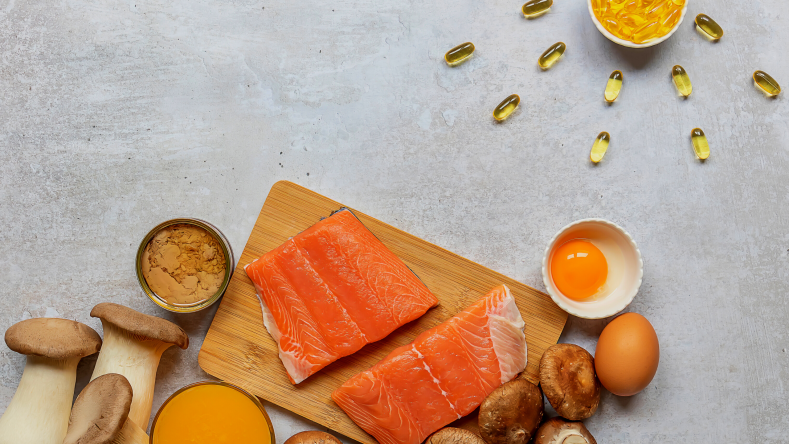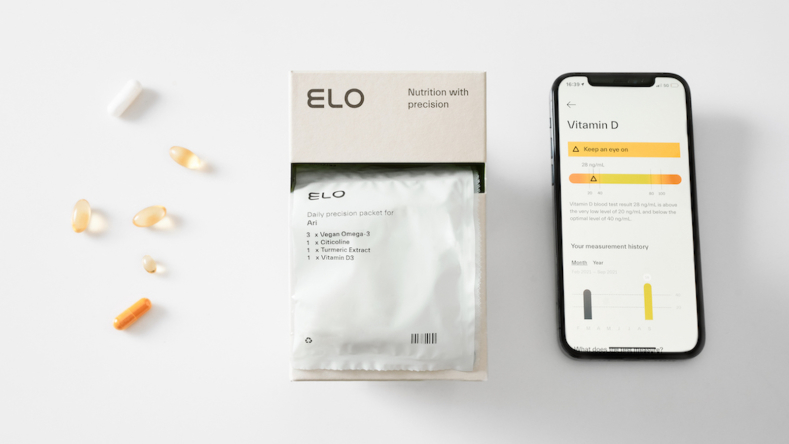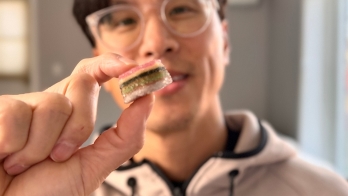Vitamin D supplements: do they work?
Vitamin D is an essential nutrient that plays a crucial role in bone health, insulin sensitivity, brain health, and immunity. However, despite its importance, 90% of Elo members start with low vitamin D levels. Here’s what science has to say about the importance of vitamin D and subsequent supplementation.

If you’re looking for ways to optimize your health, then go no further than vitamin D. This vitamin plays a crucial role in maintaining strong bones, reducing COVID-19 severity, and supporting immune and brain health, yet, despite its importance, many people fall short. So, how can you get more vitamin D in your diet, and are supplements the answer? Here’s everything you need to know about vitamin D.
Why is vitamin D important?
Vitamin D has many critical roles in the body, and is essential for calcium absorption and immune function, as well as bone, muscle, and heart health. Vitamin D also has important anti-inflammatory, antioxidant, and neuroprotective properties that support brain health [ 1 2
Inadequate vitamin D levels can have significant health consequences, as deficiency in adults is associated with the following:
Bone diseases. Vitamin D increases calcium absorption in the gut and plays an important part in maintaining bone health by regulating calcium and phosphorus. Low vitamin D can contribute to the development of osteoporosis, rickets, and other bone diseases [
3
].Immune health. Studies have shown a link between vitamin D deficiency and increased risk of infections and higher rates of autoimmune disease [
4
]. This is likely due to the important role vitamin D plays in improving immune function, reducing inflammation, and modulating growth and development. Though more evidence is needed, early research suggests having optimal vitamin D levels may lower your risk for COVID-19 infection and severity [4
].Type 2 diabetes: Vitamin D plays a role in insulin production and sensitivity, with research showing a clear association between low vitamin D levels in patients with insulin resistance and a high risk of developing type 2 diabetes [
5
]. Moreover, it’s suggested that low vitamin D status contributes to elevated glycosylated hemoglobin (HbA1c), a marker of insulin resistance [5
].Cancer: Current evidence seems to suggest higher vitamin D levels may be beneficial for those diagnosed with cancer. One meta-analysis found overall survival from colorectal cancer, lung cancer, and lymphoma was greater in people with higher blood levels of vitamin D. There may also be a modest benefit for vitamin D supplementation during treatment [
6
].Autoimmune diseases: Vitamin D plays a role in the prevention and protection of autoimmune diseases, including multiple sclerosis, type 1 diabetes, and systemic lupus erythematosus (SLE, the most common type of lupus) [
7
].Neurodegenerative diseases: An increasing number of studies indicate that vitamin D deficiency is associated with a wide range of neuropsychiatric disorders and neurodegenerative diseases including depression, Alzheimer’s, and Parkinson’s [
8
].
How much vitamin D do you need?
The Recommended Dietary Allowance (RDA) for people between the ages of 1 and 70 is 600 IU/day, and for adults over 70 the RDA is 800 IU/day [ 9 10 11 12 13
For moderate supplementation, a daily dose of 1,000–2,000 IU of vitamin D3 is sufficient to meet most people’s needs, with the safe upper limit set at 4,000 IU/day [ 9 10 21
Are you low on vitamin D? Learn more about
improving your levels
through nutrition, supplementation, and sunshine.
Sources of vitamin D
The best sources of vitamin D are with sun exposure and a few foods.

Sun exposure
Appropriately nicknamed “the sunshine vitamin”, vitamin D is produced endogenously in the skin when you are exposed to the sun’s UVB rays [ 14
When UVB rays penetrate your skin, a type of cholesterol called 7-dehydrocholesterol converts into vitamin D3 —the same form that you find in supplements. Vitamin D3 is then carried to your liver and kidneys where it is turned into active vitamin D. A modest amount of regular sun exposure can increase vitamin D levels but without it, the body cannot make vitamin D and levels may decrease.

Dietary sources
While direct sun exposure is the body’s best source of vitamin D, both vitamin D2 (ergocalciferol) and D3 (cholecalciferol) can be obtained from the diet in small amounts. You can obtain these two forms with the following foods:
Vitamin D2: This is derived from plants and fungi, such as irradiated yeast and certain mushrooms. These foods may also be exposed to ultraviolet light to increase vitamin D content.
Vitamin D3: Found in animal sources like fatty fish (tuna, salmon, mackerel, and cod liver oil), with smaller amounts in egg yolks, cheese, and beef liver.
Many foods are also fortified with vitamin D, including dairy and plant-based milk, yogurt, orange juice, and breakfast cereals.

Why do you need to supplement with vitamin D?
Since many people do not get enough daylight year-round to produce adequate vitamin D and it’s only found in a few foods, deficiency is extremely common (90% of Elo members start with low levels) and you may need to supplement to meet your needs.
Based on a thorough review of the research, Elo Health classifies vitamin D status
Very low: <20 ng/mL
Low: 20-40 ng/mL
Optimal: 40-80 ng/mL
Elevated: 80-100 ng/mL
High: >100 ng/mL
You likely need a vitamin D supplement if you have suboptimal vitamin D levels (<40 ng/mL), do not get regular sun exposure year-round, have a low dietary intake of vitamin D, or are at increased risk for vitamin D deficiency.
If you’re confused about how much vitamin D you should take, there’s no need to worry. At Elo Health, we take the guesswork out of the equation by overlaying your blood biomarker results, wearable data, and questionnaire answers to recommend the right nutrition and supplements for you. Your personalized daily smart supplement pack contains custom-dosed nutrients selected for your biomarkers, health data, and goals, based on the latest available science. Moreover, Elo’s formulary includes over 60 nutrients (including vitamin D), all of which undergo rigorous third-party testing.
Who needs vitamin D supplements?
Certain individuals are at risk for low vitamin D levels and may need to supplement to maintain healthy levels. These include [ 9
Older adults
Individuals with a dark complexion
People living in cold climates or north of 37°N latitude
Those with limited or minimal sun exposure
Women who are pregnant and/or breastfeeding
People with Cystic fibrosis, Crohn's, celiac, kidney, and liver disease, or other conditions that interfere with vitamin D absorption or synthesis
Obese individuals or those who have had gastric bypass surgery
When should you take vitamin D?
Vitamin D can be taken in the morning or night, but because vitamin D is fat-soluble, it’s recommended to pair it with a meal or foods that are high in fat (like avocados, nuts, nut butter, or olive oil), as this will help increase the absorption of vitamin D into your bloodstream [ 10 17
What should you look for in a vitamin D supplement?
When looking for a vitamin D supplement, you should choose one that has vitamin D3, since studies have found that this form is 87% more effective at raising and maintaining vitamin D levels than vitamin D2 [ 10 15 18
Vegan vitamin D supplement
Many vitamin D supplements are not vegan as they use animal sources of vitamin D3, like the skin of fatty fish and lanolin from sheep wool. If you’re looking for a vegan vitamin D supplement, you have two options: vitamin D2 (which is always derived from plants) or vitamin D3 sourced from lichen or microalgae.
Since vitamin D2 is made from plants, this vegan vitamin D supplement is always suitable for vegans. However, it is not as effective as D3 for increasing vitamin D levels, so this form may not be adequate, particularly if you have a moderate or severe deficiency, increased nutrient needs, or a condition that reduces vitamin D absorption.
The better option for vegans is a supplement sourced from lichen or microalgae, as these contain the more bioavailable and effective form of vitamin D3 [ 19
Is liquid vitamin D better than pill form?
Though the research comparing the two is limited, liquid vitamin D appears to be equally effective as a pill for raising vitamin D levels [ 20
Summary
Vitamin D has many critical roles in the body, and is essential for calcium absorption and immune function, as well as bone, muscle, and heart health. Vitamin D also has important anti-inflammatory, antioxidant, and neuroprotective properties that support immune and brain health [ 1 2
The best sources of vitamin D are direct sun exposure and vitamin D supplements, as well as certain foods including fatty fish, fish oil, mushrooms, and fortified foods. However, since many people do not get enough daylight year-round to produce adequate vitamin D and it’s only found in a few foods, supplementation may be necessary to meet vitamin D needs.
Disclaimer: The text, images, videos, and other media on this page are provided for informational purposes only and are not intended to treat, diagnose or replace personalized medical care.
Key takeaways
Vitamin D is an essential nutrient that plays a crucial role in bone health, insulin sensitivity, brain health, and immunity.
The Recommended Dietary Allowance (RDA) for people between the ages of 1 and 70 is 600 IU/day, and for adults over 70 the RDA is 800 IU/day [
9
]. However, recent research shows that Vitamin D supplementation can be used at 5,000 IU/day (and up to 10,000 IU/day) without any adverse effects [21
].Since many people do not get enough daylight year-round to produce adequate vitamin D and it’s only found in a few foods, deficiency is extremely common and you may need to supplement to meet your needs.
Studies have found that supplementing with vitamin D3 is 87% more effective at raising and maintaining vitamin D levels than vitamin D2 [
10
,15
,18
].
References
Vitamin D. (2021, February 9). Mayo Clinic. Retrieved March 29, 2022, from
https://www.mayoclinic.org/drugs-supplements-vitamin-d/art-20363792
Nair, R., & Maseeh, A. (2012). Vitamin D: The "sunshine" vitamin. Journal of pharmacology & pharmacotherapeutics, 3(2), 118–126.
https://doi.org/10.4103/0976-500X.95506
Holick M. F. (1996). Vitamin D and bone health. The Journal of nutrition, 126(4 Suppl), 1159S–64S.
https://doi.org/10.1093/jn/126.suppl_4.1159S
Demir, M., Demir, F., & Aygun, H. (2021). Vitamin D deficiency is associated with COVID-19 positivity and severity of the disease. Journal of medical virology, 93(5), 2992–2999.
https://doi.org/10.1002/jmv.26832
Kayaniyil, S., Vieth, R., Retnakaran, R., Knight, J. A., Qi, Y., Gerstein, H. C., Perkins, B. A., Harris, S. B., Zinman, B., & Hanley, A. J. (2010). Association of vitamin D with insulin resistance and beta-cell dysfunction in subjects at risk for type 2 diabetes. Diabetes care, 33(6), 1379–1381.
https://doi.org/10.2337/dc09-2321
Examine.com. (2019, April). A D-fence against cancer?
https://examine.com/members/deep-dives/article/a-d-fence-against-cancer/
Yang, C. Y., Leung, P. S., Adamopoulos, I. E., & Gershwin, M. E. (2013). The implication of vitamin D and autoimmunity: a comprehensive review. Clinical reviews in allergy & immunology, 45(2), 217–226.
https://doi.org/10.1007/s12016-013-8361-3
Groves, N. J., McGrath, J. J., & Burne, T. H. (2014). Vitamin D as a neurosteroid affecting the developing and adult brain. Annual review of nutrition, 34, 117–141.
https://doi.org/10.1146/annurev-nutr-071813-105557
Office of Dietary Supplements - Vitamin D. (2021, August 17). National Institutes of Health. Retrieved March 29, 2022, from
https://ods.od.nih.gov/factsheets/VitaminD-HealthProfessional/
Patel, K. (2022, March 28). Vitamin D. Examine.Com. Retrieved March 29, 2022, from
https://examine.com/supplements/vitamin-d/
Aloia, J. F., Patel, M., Dimaano, R., Li-Ng, M., Talwar, S. A., Mikhail, M., Pollack, S., & Yeh, J. K. (2008). Vitamin D intake to attain a desired serum 25-hydroxyvitamin D concentration. The American journal of clinical nutrition, 87(6), 1952–1958.
https://doi.org/10.1093/ajcn/87.6.1952
Talwar, S. A., Aloia, J. F., Pollack, S., & Yeh, J. K. (2007). Dose response to vitamin D supplementation among postmenopausal African American women. The American journal of clinical nutrition, 86(6), 1657–1662.
https://doi.org/10.1093/ajcn/86.5.1657
Ekwaru, J. P., Zwicker, J. D., Holick, M. F., Giovannucci, E., & Veugelers, P. J. (2014). The importance of body weight for the dose response relationship of oral vitamin D supplementation and serum 25-hydroxyvitamin D in healthy volunteers. PloS one, 9(11), e111265.
https://doi.org/10.1371/journal.pone.0111265
Vitamin D. (2022, March 2). The Nutrition Source. Retrieved March 29, 2022, from
https://www.hsph.harvard.edu/nutritionsource/vitamin-d/
Tripkovic, L., Lambert, H., Hart, K., Smith, C. P., Bucca, G., Penson, S., Chope, G., Hyppönen, E., Berry, J., Vieth, R., & Lanham-New, S. (2012). Comparison of vitamin D2 and vitamin D3 supplementation in raising serum 25-hydroxyvitamin D status: a systematic review and meta-analysis. The American journal of clinical nutrition, 95(6), 1357–1364.
https://doi.org/10.3945/ajcn.111.031070
25-hydroxy vitamin D test. (22–03-21). MedlinePlus. Retrieved March 29, 2022, from
https://medlineplus.gov/ency/article/003569.htm
Dawson-Hughes, B., Harris, S. S., Lichtenstein, A. H., Dolnikowski, G., Palermo, N. J., & Rasmussen, H. (2015). Dietary fat increases vitamin D-3 absorption. Journal of the Academy of Nutrition and Dietetics, 115(2), 225–230.
https://doi.org/10.1016/j.jand.2014.09.014
Heaney, R. P., Recker, R. R., Grote, J., Horst, R. L., & Armas, L. A. (2011). Vitamin D(3) is more potent than vitamin D(2) in humans. The Journal of clinical endocrinology and metabolism, 96(3), E447–E452.
https://doi.org/10.1210/jc.2010-2230
Jäpelt, R. B., & Jakobsen, J. (2013). Vitamin D in plants: a review of occurrence, analysis, and biosynthesis. Frontiers in plant science, 4, 136.
https://doi.org/10.3389/fpls.2013.00136
Helde Frankling, M., Norlin, A. C., Hansen, S., Wahren Borgström, E., Bergman, P., & Björkhem-Bergman, L. (2020). Are Vitamin D3 Tablets and Oil Drops Equally Effective in Raising S-25-Hydroxyvitamin D Concentrations? A Post-Hoc Analysis of an Observational Study on Immunodeficient Patients. Nutrients, 12(5), 1230.
https://doi.org/10.3390/nu12051230
Ghanaati, S., Choukroun, J., Volz, U., Hueber, R., Mourão, C. F. de, Sader, R., Kawase-Koga, Y., Mazhari, R., Amrein, K., Meybohm, P., & Al-Maawi, S. (2020). One hundred years after Vitamin D discovery: Is there clinical evidence for supplementation doses? International Journal of Growth Factors and Stem Cells in Dentistry, 3(1), 3.
https://doi.org/10.4103/gfsc.gfsc_4_20






